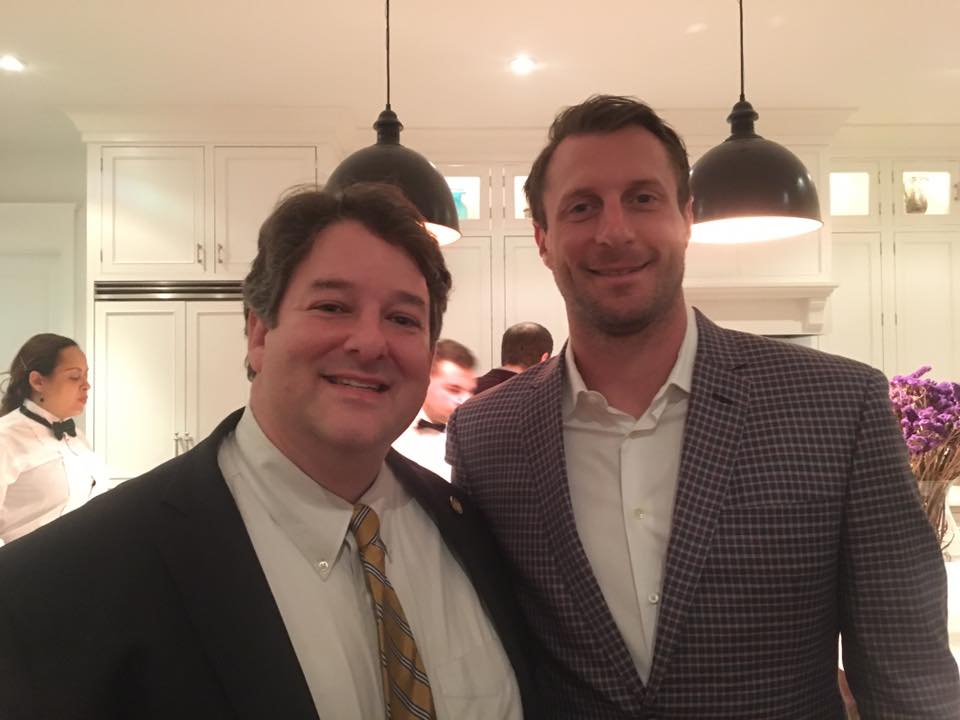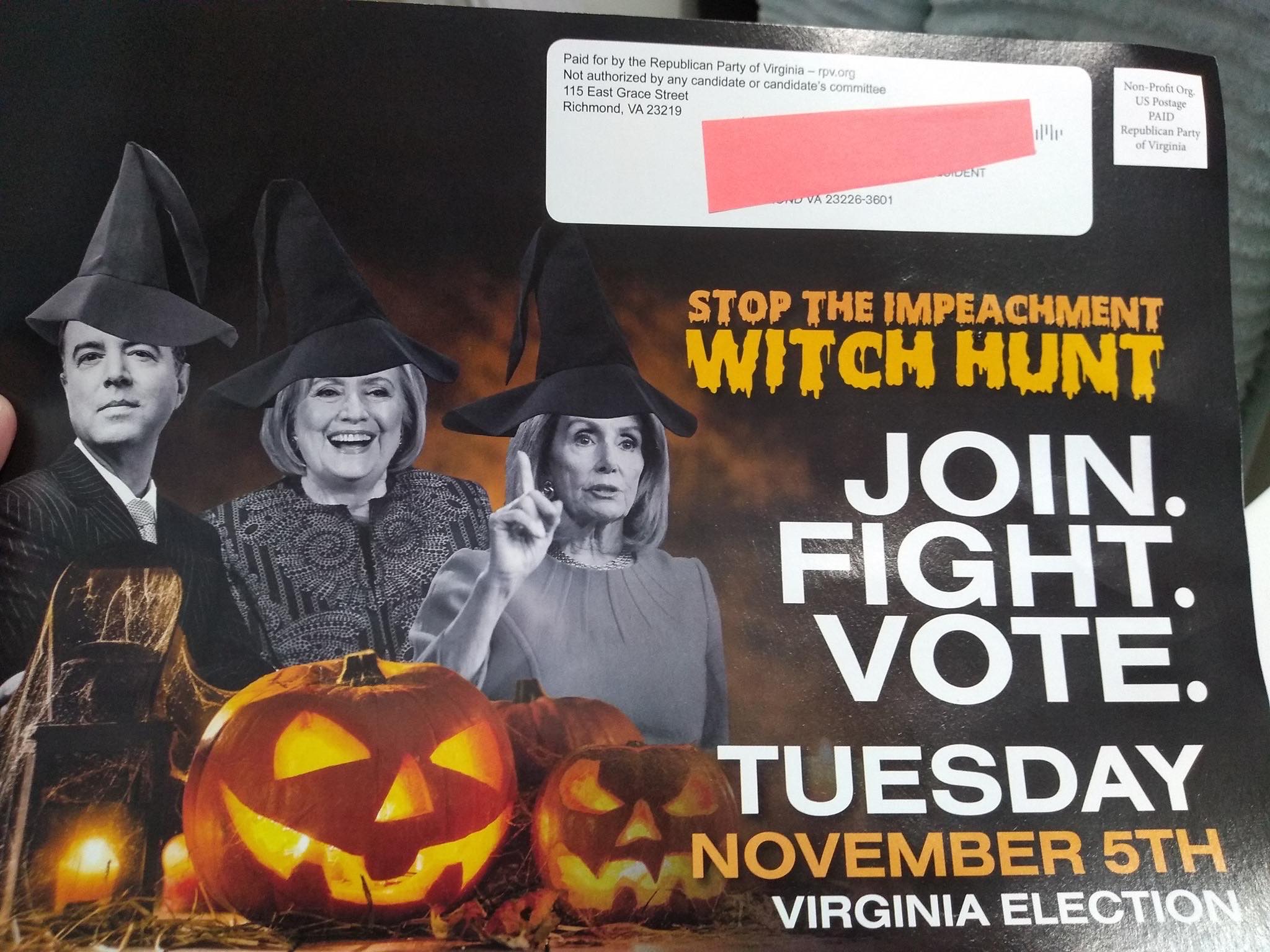I like this one by Roanoke College better than the other two, but still too close for comfort IMHO…
Gillespie closes the gap on Northam; Virginians favor tax cuts, free community college, and keeping Confederate monuments
Democratic gubernatorial candidate Ralph Northam leads Republican Ed Gillespie by six percentage points (50%-44%), while Libertarian Cliff Hyra garners two percent of likely voters, and only four percent remain undecided, according to The Roanoke College Poll. The Institute for Policy and Opinion Research interviewed 607 likely voters in Virginia between Oct. 8 and Oct. 13 and the poll has a margin of error of +4 percent.
Democrat Justin Fairfax leads Republican Jill Vogel (45%-42%) in the race for lieutenant governor, and incumbent Democrat Mark Herring leads Republican John Adams (47%-42%) in Virginia’s attorney general contest.
The race for governor – candidates’ standing and issues
Both Northam (38%-28%) and Gillespie (38%-33%) are viewed more favorably than unfavorably by voters. While 20 percent still don’t know enough about Gillespie to have an opinion about him, and 27 percent don’t know enough about Northam, both figures continue to decline. Cliff Hyra remains largely unknown with 87 percent of respondents not knowing enough about him to have an opinion.
The economy and health care continue to dominate as the most important issues in the campaign. Economic issues (jobs, growth, etc.) are seen as most important by 18 percent of respondents with another four percent saying taxes and two percent referencing debt. Health care was named as the most important issue by 16 percent of likely voters, while education was thought to be most important by eight percent and seven percent named immigration. Responses to questions regarding which candidate would do a better job on various issues can be seen in the table below.
Which candidate would do a better job on the issues?
Ed Gillespie
- Economy: 46%
- Healthcare: 37%
- Jobs: 43%
- Immigration: 43%
- Education: 37%
- Taxes: 43%
- Guns: 43%
Ralph Northam
- Economy: 38%
- Health Care: 48%
- Jobs: 40%
- Immigration: 42%
- Education: 47%
- Taxes: 40%
- Guns: 43%
Among two important groups, Northam leads among ideological moderates (61%-28%), and holds an insignificant lead among political Independents (45%-42%). Northam has the support of 94 percent of Democrats, while Gillespie is supported by 93 percent of Republicans. Liberals favor Northam (89%-3%) while Conservatives prefer Gillespie (81%-15%).
President Trump, the country, and the Commonwealth
More than half of those polled (58%) disapprove of the way President Donald Trump is handling his job, and just over one-third (35%) approve, which is statistically unchanged since September. At the same time, a majority (56%) of respondents have an unfavorable view of him, while 34 percent have a favorable impression of Trump.
A majority (64%) of Virginians think the country is on the wrong track, while 30 percent think it is headed in the right direction. Congressional job approval sits at 10 percent.
A plurality of likely voters (48%) think that Virginia is heading in the right direction, while 40 percent think it has gotten off on the wrong track. Almost half (48%) approve of the job Terry McAuliffe is doing as governor, while 35 percent disapprove. Governor McAuliffe is viewed favorably by 41% of respondents.
Views of political parties
The Republican Party is viewed unfavorably by 47 percent of likely voters (36% favorable), while the Democratic Party is seen favorably by 45 percent and unfavorably by 41 percent. Respondents were also asked if they associated various words with the parties. The results can be seen below.
How does the party make you feel?
Democratic Party
- Frustrated: 30%
- Angry: 18%
- Afraid: 14%
- Hopeful: 18%
- Enthusiastic: 9%
- Proud: 10%
Republican Party
- Frustrated: 31%
- Angry: 21%
- Afraid: 17%
- Hopeful: 14%
- Enthusiastic: 6%
- Proud: 9%
Respondents who said they felt frustrated, angry or afraid were asked a follow-up question. Among those who expressed a negative association with the Republican Party, 60 percent said the party’s policies are so misguided that they threaten the nation’s well-being. The Democratic Party fared only marginally better at 54 percent.
The Roanoke College Poll is funded by Roanoke College as a public service.
Political anxiety
IPOR continues to track political anxiety in the Commonwealth. More than eight in 10 (88%) likely voters trust the federal government to do what is right only some of the time or never. However, a majority (57%) thinks that ordinary citizens can do a lot to influence the federal government. Six in 10 (60%) think their side is losing more than winning in politics today.
Most respondents (56%) think the country’s best years are ahead of it, while just over one-third (37%) think its best years have passed. Overall, a large majority of Virginians (87%) continues to see the nation divided regarding the important issues facing the United States.
A majority of respondents (54%) is dissatisfied with how the federal government is (or isn’t) working. Another 26 percent are angry, while only 15 percent are satisfied and three percent is enthusiastic. These responses are essentially unchanged since we asked most recently in August.
Analysis
“Northam continues to lead in the race for governor, but in sports parlance, Gillespie keeps ‘hanging around,'” said Harry Wilson, director of the Roanoke College Poll. “Republicans have closed well in the last weeks of the campaign in the 2013 gubernatorial contest and in Gillespie’s challenge to Sen. Mark Warner in 2014. Republicans came up short both times, but the results on Election Day were closer than most, if not all, polls had predicted.”
Methodology
Interviewing for The Roanoke College Poll was conducted by The Institute for Policy and Opinion Research at Roanoke College in Salem, Va. between October 8 and October 13, 2017. A total of 607 likely voters in Virginia were interviewed. Telephone interviews were conducted in English and Spanish. The sample was drawn from a list of registered voters compiled by L2 Political. Participants were sampled from that list, which has phone numbers associated with approximately 60 percent of the registered voters in Virginia. The list included both landlines and cell phones. Cell phones constituted 38 percent of the completed interviews.
Questions answered by the entire sample of 607 residents are subject to a sampling error of plus or minus approximately 4 percent at the 95 percent level of confidence. This means that in 95 out of 100 samples like the one used here, the results obtained should be no more than 4 percentage points above or below the figure that would be obtained by interviewing all Virginia likely voters who have a home telephone or a cell phone. Where the results of subgroups are reported, the sampling error is higher.
Quotas were used to ensure that different regions of the Commonwealth were proportionately represented. The data were statistically weighted for gender, race, age and political party. Weighting was done to match the 2013 Virginia statewide election exit poll. The margin of error was not adjusted for design effects due to weighting.
A copy of the questionnaire and topline and crosstabs may be found here.















